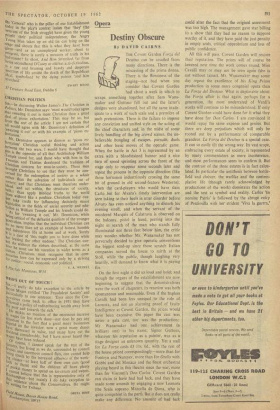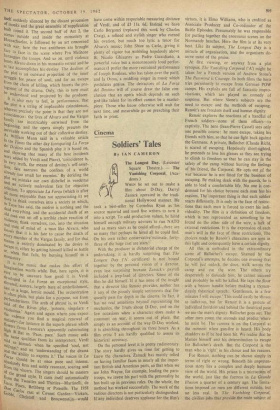Opera
Destiny Obscure
By DAVID CAIRNS
THE Covent Garden Forza del Destino can be assailed from many directions. There is the miscasting of the prima donna. There is the flimsiness of the staging—not bad when you consider that Covent Garden had about a week in which to scrape something together after Sam Wana- maker and Guttuso fell out and the latter's designs were abandoned, but all the same inade- quate to a work of such scale and a premiere of such pretensions. There is the failure to impose any conviction and unified style on the acting of the chief characters and, in the midst of some lively handling of the big crowd scenes, the un- believable bungling of escapes, pursuits, duels and other basic moves of the operatic game. When the battle in Act 3 is represented by an extra with a bloodstained banner and a nice turn of speed sprinting across the front of the stage only to reappear some seconds later and repeat the process in the opposite direction (like those horsemen industriously crossing the same bit of ground in old second-feature Westerns); when the card-players who would have slain Carlo but for Alvaro's timely intervention are seen taking to their heels in utter disorder before Alvaro has even noticed anything to disturb his evening stroll; and when the servant of the murdered Marquis of Calatrava is observed on the balcony. pistol in hand, peering into the night in search of the man who stands fully illuminated not three feet below him, the critic may wonder whether Mr. Wanamaker has not perversely decided to give operatic conventions the biggest send-up since those scratch Italian companies moved the house to mirth at the Stoll, while the public, though laughing very heartily, will demand to know what it is paying for.
On the first night it did so loud and bold; and though the organs of the establishment are now beginning to suggest that the demonstrations were the work of claqueurs, its reaction was both spontaneous and reasonable. Even if the hapless Cavalli had been Iess unequal to the role of Leonora, and not an alarming proof of faulty Intelligence at Covent Garden, the prices would have been excessive. On paper the cast was never a gala cast, nor was the production: Mr. Wanamaker had one achievement (a brilliant one) to his name; Signor Guttuso, whatever his reputation as a painter, was as a stage designer an unknown quantity. Yet a stall foi La Forza costs £3 Its. 6d., with the rest of the house priced correspondingly—more than for Fonteyn and Nureyev, more than for Otello with Gobbi and del Monaco and the finest orchestral playing heard in this theatre since the war, more than for Visconti's "Don Carlos. Covent Garden can claim to have had bad luck, and they have made some amends by engaging a new Leonora (the Scala soprano Marcella de Osma, who is quite competent in the part). But it does not really make any difference. No amount of bad luck could alter the fact that the original assessment was too high. The management gave star billing to a show that they had no reason to suppose worthy of it, and they have paid the just penalty in empty seats, critical opprobrium and loss of public confidence.
All this will pass. Covent Garden will restore their reputation. The prices will of course be lowered next time the work comes round. Miss Cavalli may or may not be seen again (she is not without talent). Mr. Wanamaker may some day repeat the excellence of his King Priam production in some more congenial opera than La Forza del Destino. What is deplorable about the Forza affair is that again, perhaps for a generation, the most underrated of Verdi's works will continue to be misunderstood. If only Covent Garden could have done for it what they have done for Don Carlos. I am convinced it would repay the same expense and genius. But there are deep prejudices which will only be rooted out by a performance of comparable grandeur. La Forza del Destino is a special case. It can so easily tilt the wrong way. Its vast scope, embracing every estate of society, is represented by many commentators as mere incoherence, and most performances seem to confirm it. But the contrast of the three estates is in fact calcu- lated. In particular the antithesis between battle- field and cloister, the warlike and the contem- plative life (though rarely acknowledged by productions of the work) dominates the action and the text as symbol and reality. Carlos 'In nomine Patris' is followed by the abrupt entry of Preziosilla with her strident 'Viva la guerra,' THE SPECTATOR, OCTOBER 19. itself suddenly silenced by the distant procession of monks and the great ensemble of supplication built round it. The second half of Act 2, the scenes outside and inside the monastery at Hornachuelos, is followed by an act concerned with war; here the two antitheses are brought face to face in the scene where Fra Melitone harangues the troops. And so on, hunts until violence Alvaro down in his monastio retreat and he az last accomplishes his destiny. The dualism of the plot is an outward projection of the inner struggle for peace of soul, and for an escape from the chain of killing, which haunts the pro- tagonist of the drama. Only, this in turn must be understood and projected by the producer. It is also easy to feel, in performance, that the Plot is a string of implausible coincidences, Whereas precisely the point is that they are not coincidences: the lives of Alvaro and the Vargas family are inextricably entwined from the ;beginning and the opera simply presents the inevitable working out of their collective destiny. As William Mann said in a valuable article in the Times the other day (comparing La Forza del Destino and the Spanish play it is based on, and showing that many of the best incidents were added by Verdi and Piave), 'coincidence is, in very truth, the means of destiny's self-asser- tion; fate narrows the confines of a world already too small for enemies.' By deriding the Plot We mistake our own disbelief in vendettas and an actively malevolent fate for objective Criticism- To appreciate La Forza (which is after all more enjoyable than not appreciating it) we have to think ourselves into a society in which, 4,8 ToYe has said, the motive is nothing and the deed everything, and the accidental death of an violence; man can set off a terrible chain reaction of Icilence; think ourselves, too, into the situation and state ate of mind of a man like Alvaro, who "ws that it is his fate to cause the death of revery member of the Vargas family, and for that escapeor, it, either by getting himself killed in battle w'r, when that fails, by burying himself in a Monastery.
It •
is the music that makes this effort of imagination worth while. But, here again, it is easy to be unaware how good it is. Verdi eleveloped in La Forza an exceptional style, _ evated, austere, largely bare of embellishment, cast ; 'n a huge, heroic mould. The orchestration _ Often plain, but plain for a purpose, not from sPae.rfunctoriness. The arch of phrase is, as Verdi ,v_ict of the Rivas play, `potence, singolare e 'stissitno.' Again and again where you expect reel cadence you find a magical renewal of hers from instance in the superb phrase which hi,ers from Leonora's apparently culminating ' 8 flat i the n Pace, pace.' Such music asks . said same qualities from its interpreters; Verdi soii se. himself when he specified 'soul, not an_,Jeggt,'• and an 'understanding of the drama Forzau the ability to express it.' The voices in La should be at once pure and intense, ra.bos absolutely t elY firm and nobly resonant, soaring and torf Mth the viscera. The singers should be masters fro e grand style. It casts itself automatically L__rna the Twenties and Thirties—Martinelli, de bu_"n cPinza, Rethberg or Ponselle. The 1958 Carlos cast at Covent Garden—Vickers, hbt, Christ° ff and Brouwenstijn—would have come within respectable measuring distance of Verdi, and of £3 Is. 6d. Instead we have Carlo Bergonzi (replaced this week by Charles Craig), a refined and stylish singer who earned his ovation, but much too lyric a tenor for Alvaro's music; John Shaw as Carlo, giving it
w
plenty of vigour but wobbling hopelessly above B; Nicolo Ghiaurov as Padre Guardian°, a powerful voice but a monotonously loud perfor- mance (I prefer the more restrained performance of Joseph Rouleau, who has taken over the part); and la Osma, a middling singer in music which postulates genius. The detractors of La Forza del Destino will of course draw the false con- clusion that an opera which depends on such god-like talent for its effect cannot be a master- piece. Those who know otherwise will wait for next time, and meanwhile go on preaching their faith in print.















































 Previous page
Previous page